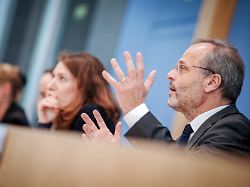Commissioner for Anti-Semitism
Massive “hatred of Jews in Germany” worries Klein
November 7, 2023, 4:28 p.m
Germany has rested on its culture of remembrance for too long, says Felix Klein, the federal government’s anti-Semitism commissioner. This is also why Holocaust commemoration is repeatedly the target of attacks. From the extreme right – but also from the middle of society.
Before the 85th anniversary of the anti-Jewish pogroms of November 9, 1938, the Federal Government’s anti-Semitism commissioner, Felix Klein, expressed his dismay at the current situation in the country. “What we have seen since October 7th is hatred of Jews at a level that has not been seen in Germany for decades,” he said in Berlin, referring to anti-Semitic incidents, for example during demonstrations after the terrorist attack on Israel by the Islamist Hamas.
The occasion was the presentation of a “civil society situation report on anti-Semitism” created by the Amadeu Antonio Foundation. The focus is on anti-Semitism from the right and attacks on memorials and places of remembrance. At the joint press conference with Klein, experts warned against losing sight of this problem in view of the current incidents. The aim of the extreme right is to rewrite German history. “Places of commemoration and remembrance are being desecrated and destroyed. Attempts are being made to make it more difficult or to prevent remembering the time of National Socialism,” it says in the 24-page paper. These attacks are to blame for the fact that the culture of remembrance in Germany is cracking.
The anti-Semitism commissioner criticized Germany for having rested for too long and praised itself for its culture of remembrance. Knowledge about the Holocaust has to be developed again and again. The current focus on anti-Semitism among Muslims should not distract from anti-Semitism among the population, said right-wing extremism researcher Beate Küpper.
Deborah Hartmann, director of the “Haus der Wannsee Conference” memorial and educational center, warned that the “defense against memory” had long since migrated from the right-wing fringe to the bourgeois center. “So we can by no means speak of a cultural memory consensus. In large parts of society, this is more fragile than it has been for a long time.”
“The poison of anti-Semitism still exists”
Jews in Germany have been in a state of emergency for a month, said Klein, referring to the current situation. Later he assured: But it is not the year 1938. “The poison of anti-Semitism still exists, it is particularly evident now. But in 2023 we live in a stable democracy with a constitutional state that protects itself and defended.”
“We have to give Jews absolute certainty that 2023 is not 1938,” said Federal Interior Minister Nancy Faeser to the “Handelsblatt”. On the night of November 9th to 10th, 1938, Nazi thugs in Germany destroyed shops and set synagogues on fire. Jews were mistreated, arbitrarily arrested and killed. “This is more than a historical responsibility. It is our self-image of humanity and cohesion.”
With a view to anti-Semitic incidents at pro-Palestinian demonstrations, the SPD politician insisted on consequences. “Anyone who abuses civil liberties in such a way to propagate crimes and hatred cannot rely on the protection of freedom of expression,” said the minister. “Anyone who relativizes or approves of Hamas’s inhumane acts is going against our values and our laws and must take responsibility for them.” She assured that the Jewish community could count on the state’s help. “But we also have to become even louder as a society and oppose hatred against Jews even more clearly.”
